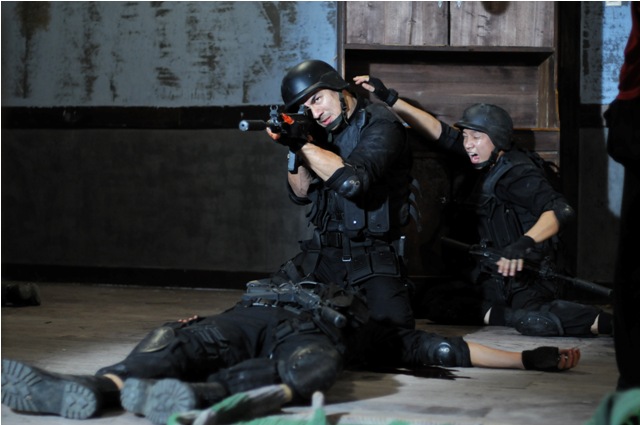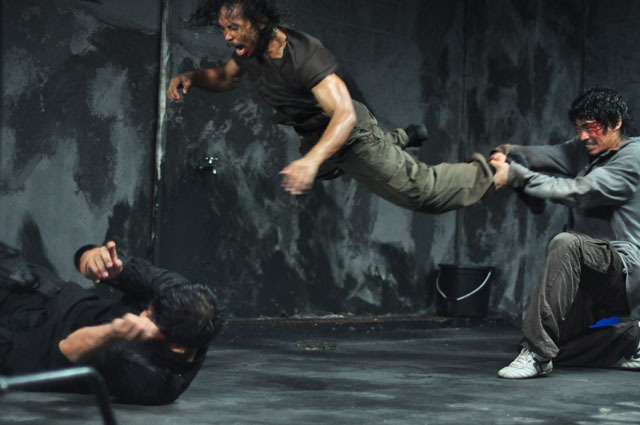|
“The Raid” tracks an
inexperienced SWAT team, led by their crusading commander, Jaka (Joe Taslim),
and their assault on a drug baron’s citadel, a towering tenement rooted in the
mazy streets of a Jakarta slum. Their operation, commissioned by a Lieutenant
Wahyu (Pierre Gruno), is implemented without any proper explanation, a
circumstance that arouses suspicion within the team. Its purpose is kept top secret,
even from Jaka. However, his inspired pep talk on justice mollifies their
jangly nerves and lucid confusion as their van nears its destination. Seated
among this group of rookies is one of the film’s protagonists, Rama (Iko
Uwais), a handsome hero with an ethic code, a mastery of martial arts and a pregnant
wife. Their target, the notorious crime boss, Tama (Ray Sahetapy), is portrayed
as an eccentric overlord consumed by obsession and paranoia. Like a jaded Tony
Montana, his eyes patrol a rectangular grid of surveillance screens, cutting
the figure of some unseen, omnipotent tyrant.
His day-to-day
commands, criminal operations and dirty work are entrusted to his two capable
lieutenants, Andi (Doni Alamsyah), a scrawny, mustached prodigy who masterminds
the gang’s initiatives and “Mad Dog” (Yayan Ruhian), a shaggy sadist who turns security
matters into his own form of human blood sport. After infiltrating and securing
the first few levels without a hitch, their mission quickly goes awry. A boy runner
scurries to a nearby panic button and presses it, activating alerts throughout
its vertical precinct and instigating a total lockdown. The lights go out and
the exits are sealed. The knowing Rama watches them from his secret office. He
makes a phone call. Shortly after, his marksmen move into position. His
henchmen are mobilised. A file of his foot soldiers appears out of nowhere and
sprays the police van parked outside, perforating its passengers and cutting
off all means of escape. Thenceforth, the stage is set for an absurd test of
endurance, comradeship and humanity wherein stylised violence is the only
answer.

Gareth Evans, a
Welshman based in Indonesia, is slowly making a reputation for himself as an
assured director of Indo action films having just completed “The Raid” and
already made the successful “Merantau” back in 2009. If his only two pictures
are anything to go by then his work symbolises the modern action film forged in
a furnace of Indocentric culture. In honoring the tradition of the action
flick, Evans’ sophomore effort flaunts its indulgent visual, choreographic and
aural stylistics with unabashed pride.
I’m talking about a gang boss who slowly munches on a few Mi Goreng strands
before walking calmly over to and executing a row of kneeling men. About a bullet
fired from long distance, travelling in slow motion through a narrow chink and
suddenly accelerating through the side of a person’s neck. About
machete-wielding hoods winding up fractured, writhing in a variety of yoga-like
poses. That kind of style. A
defining feature of its aesthetic is its integration of the Silat fighting
style. For the curious and
uninitiated, Silat is a traditional martial art native to the Indo archipelago
and Malay Peninsula. The film is principally used to expose this discipline to
a broader international audience. No joy will be had for those seeking
substance behind the surface. Having said that, those game enough to suspend
disbelief, sit back and savor the spectacle will find a few pleasant surprises
in store.
Two of its main
drawcards are Iko Uwais and Joe Taslim, both ace fighters in the Silat and Judo
arts respectively. Whilst neither of them represents the second coming of Bruce
Lee, Jet Li or Jackie Chan, they both deliver decent performances. Uwais wrings
as much as he can out of his one-dimensional character, emotionally and
martially, showing that he has much more to offer than eye candy. Taslim plays his hard-boiled role with brio
but lacks the intensity of presence or emotional substance that could have made
his performance estimable. The fight sequences are often believable and
electrifying. However, if stylistic violence were to be the only metric by
which this film were measured, then it falls short of greatness by a wide mark.
By comparison, the fight sequences lack say the terrifying realism of David
Cronenberg’s “Eastern Promises”, the sheer brutality of Gordon Chan’s “Fist of
Legend” or the star quality of someone like Sylvester Stallone in Ted
Kotcheff’s “Rambo: First Blood”. They are merely solid, entertaining sequences
performed in varied fighting styles against many opponents. The most distinct feature of the fight scenes is that many of the
Silat techniques resemble wrestling manoeuvres. In addition to the standard
combative flurries, there is a wide array of physical-intensive grappling,
tossing and counter moves. For a split second, I could have sworn that I even
saw someone getting chokeslammed. The over-the-top action is also tinged, at
timely moments, with dark humour, recalling Michael Davis’ “Shoot Em Up”. These
self-reflexive visual gags sneak in a few good laughs, adding another dimension
to its gory excess.

The film flexes weak
when it takes its own popcorn morality a little too seriously, at its worst,
trafficking in cheesy pap, embodied by such lines as “in the darkness I can
save you, but out there, can you save me? I cannot live out there”. This standard
of superficiality is most epitomised through its thematisation of police
corruption. About midway through, we discover that corruption is rife at the
apex of the police hierarchy; however, we never learn anything about the
identities, operations or significance of the bigwigs involved. We only develop
a remote awareness of what’s going on through a dialogue crammed with arcane
implications that gets rushed through right at the end. It all comes across as
peripheral and ham-fisted. There are a few twists that entwine the protagonists
together but they never evolve into anything substantial. Moreover, whilst the
film’s adherence to convention is a crowd-pleasing attraction, it also places a
curb on what the movie can achieve or be remembered for. It ends up drawing the
same cookie-cutter concepts from a wellspring that never had that much depth or
reserve to begin with. At the same time, all of these faults are somewhat
immaterial as the fight scenes are made to occupy the film’s central focus.
In conclusion,
Evans’ film impresses itself as a patchwork of flimsy generic ideas that gets
glossed over by its entertaining fight scenes and stimulating sound track.
Depending on the viewer, this film will likely represent an exotic
transcultural curiosity, a fun night out or an exciting addition to the growing
body of Indo action cinema.
|